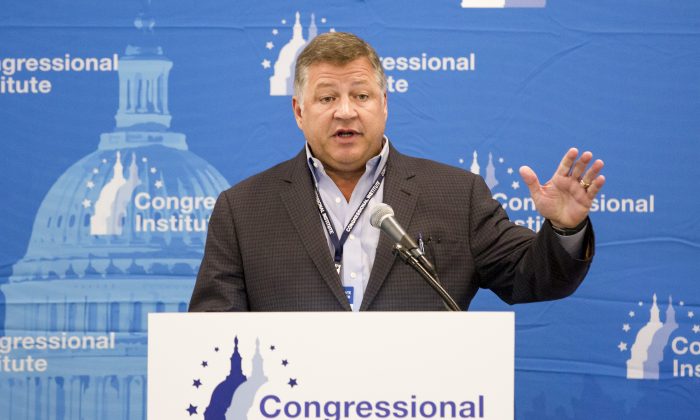In his State of the Union Speech, President Donald Trump called for bipartisan support to rebuild America’s “crumbling” infrastructure. While a plan to modernize infrastructure appeals to both sides of the political aisle, there are many questions hovering over how to fund the president’s $1.5 trillion infrastructure plan.
Transportation Secretary Elaine Chao met with top Republicans to discuss the infrastructure strategy at the Annual House and Senate Republican Conference in West Virginia on Feb. 1.
After the meeting, Representative Bill Shuster (R-Pa.), chairman of the House Transportation Committee, told reporters that they are focusing on a plan that should be bipartisan and fiscally responsible.
Shuster said he brought up the idea of raising the gas tax during the meeting and urged his fellow Republicans to consider it to fund the U.S. highway system.
“We need to deal with the shortfall in the Highway Trust Fund. It is projected to run out of money in October 2020,” he said.
Shuster called the gas tax “the elephant in the room” and said the reaction to his proposal was “mixed.”
“Nobody wants to raise taxes, nobody wants to raise fees in this country,” he said.
He reminded that since 2012, 31 states hiked their fuel taxes to fund the costs of road construction and maintenance and 19 of those states were Republican-governed.
Not a single lawmaker in his state of Pennsylvania lost a seat, however, for raising the gas tax, he said.
“Because American people understand that we need to invest in our infrastructure,” he said, adding that 100 percent of the Highway Trust Fund (HTF) goes into the system to rebuild, maintain, and expand the infrastructure.
Shuster will not seek re-election in November. According to a report by the Washington Examiner, he will spend most of his time focusing exclusively on working with the president and Congress to pass an infrastructure bill this year before his retirement.
Trump’s position on raising the gas tax is not clear. According to a Jan. 10 Washington Post article, Trump privately proposed “massively increasing” the gas tax but Republican leaders in Congress refused the idea.
“I have complete confidence that we will not be raising the gas tax,” said Sen. John Cornyn (R-Tex.), according to the same report.
Congress hasn’t raised the federal gas tax in 25 years. The current federal fuel tax is 18.4 cents per gallon for gasoline and 24.4 cents per gallon for diesel fuel. And it is not indexed to inflation.
Fuel taxes mostly go into the Highway Trust Fund, with a very small portion financing the Leaking Underground Storage Tank Trust Fund.
According to the U.S. Chamber of Commerce, raising the federal fuel user fee (gas tax) is “the simplest, fairest, and most effective way to raise the money for roads, bridges, and transit.”
“Increasing the fee by a total of $.25 cents, indexed for inflation and improving fuel economy, would raise $394 billion over the next 10 years,” said Thomas Donohue, president and CEO of U.S. Chamber of Commerce at America’s Infrastructure Summit on Jan. 18.
The increase in the fee would cost the average driver about $9 a month, versus nearly $40 per month in higher maintenance cost resulting from deteriorating roads, he said.
From The Epoch Times
Recommended Video:


